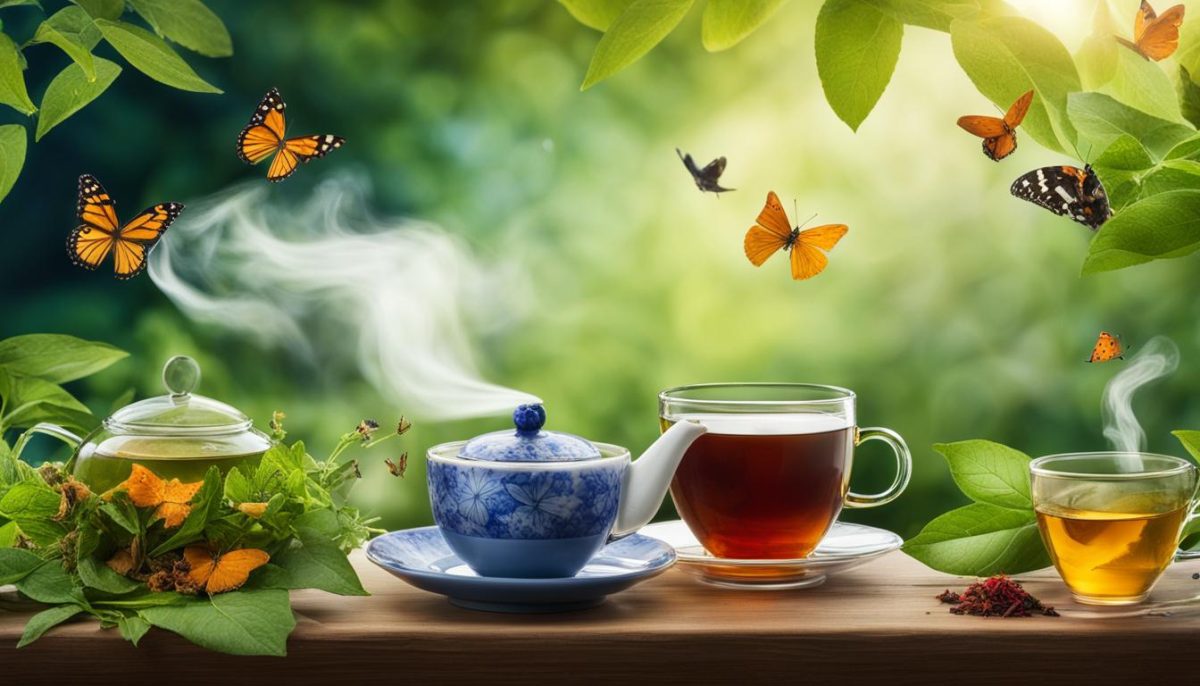Matcha
Teas for Health
Tea has been consumed for centuries, not just for its delightful flavors, but also for its numerous health benefits. From soothing chamomile to invigorating green tea, each type of tea offers unique medicinal properties that can support our overall well-being. In this article, we will explore the different types of tea and their potential health benefits.
Key Takeaways:
- Tea has been used for centuries for its medicinal properties and offers a range of health benefits.
- Different types of tea, such as chamomile, ginger, peppermint, hibiscus, and more, have specific health benefits.
- Tea can aid in sleep, digestion, blood pressure regulation, cognitive function, mood regulation, and more.
- Incorporating tea into your daily routine can support your overall health and well-being.
- Enjoy tea in various forms, such as steeping, cooking, or using it as a marinade, to reap its health benefits.
Chamomile Tea for Sleep and Immunity
Chamomile tea is a popular herbal infusion known for its soothing and calming effects, making it an excellent choice for promoting a restful night’s sleep. The unique combination of chamomile’s natural compounds helps to relax the body and mind, easing anxiety and stress that can interfere with sleep. Sipping on a warm cup of chamomile tea before bedtime can create a sense of relaxation, helping you unwind and prepare for a peaceful slumber.
In addition to its sleep-inducing properties, chamomile tea also offers potential benefits for immune health. This herbal tea contains anti-inflammatory properties that may help support a healthy immune system. By reducing inflammation in the body, chamomile tea may enhance the body’s natural defense mechanisms and promote overall well-being.
Furthermore, chamomile tea has been associated with anti-anxiety properties, which can contribute to improved sleep quality. It can help calm the mind and reduce feelings of restlessness or nervousness, allowing for a more relaxed state conducive to better sleep.
Table: Comparison of Sleep Benefits
| Tea | Sleep Benefits |
|---|---|
| Chamomile Tea | Promotes relaxation and sleep |
| Other Teas | May have varying effects on sleep quality |
“Chamomile tea provides a soothing and calming effect, making it a great option for those struggling with sleep disturbances or looking to enhance their sleep quality.”
When incorporating chamomile tea into your sleep routine, it’s important to note that individual experiences may vary. While chamomile tea can be a helpful tool for relaxation and sleep, it is not a substitute for addressing underlying causes of sleep issues or comprehensive sleep hygiene practices. Consult with a healthcare professional for personalized guidance and advice.
Ginger Tea for Nausea and Digestion
When it comes to soothing an upset stomach and improving digestion, ginger tea is a popular choice. Ginger has been used for centuries as a natural remedy for nausea, and drinking ginger tea can provide relief from various types of gastrointestinal discomfort.
Gingerols, the active compounds in ginger, have been found to have potent anti-inflammatory and antioxidant properties. These properties not only help reduce inflammation in the digestive tract but also contribute to ginger’s potential as an anticancer agent.
Moreover, research suggests that ginger tea may help regulate blood sugar levels. Studies have shown that ginger may improve insulin sensitivity, which can be beneficial for individuals with diabetes or those looking to maintain stable blood sugar control.
| Health Benefits of Ginger Tea | References |
|---|---|
| Relieves nausea and aids digestion | Johnston, C. S., & Kim, C. M. (2006). Ginger (Zingiber officinale) and nausea: a systematic review of randomized controlled trials. Nutrition Reviews, 64(7), 333-340. |
| Anti-inflammatory and antioxidant properties | Grzanna, R., Lindmark, L., & Frondoza, C. G. (2005). Ginger—an herbal medicinal product with broad anti-inflammatory actions. Journal of Medicinal Food, 8(2), 125-132. |
| Potential anticancer effects | Surh, Y. J., Lee, E., & Lee, J. M. (2005). Chemoprotective properties of some pungent ingredients present in red pepper and ginger. Mutation Research/Fundamental and Molecular Mechanisms of Mutagenesis, 579(1-2), 123-132. |
| Regulates blood sugar levels | Shidfar, F., Rajab, A., Rahideh, T., Khandouzi, N., Hosseini, S., & Shidfar, S. (2015). The effect of ginger (Zingiber officinale) on glycemic markers in patients with type 2 diabetes. Journal of Complementary and Integrative Medicine, 12(2), 165-170. |
Whether you’re experiencing nausea, indigestion, or looking to support your overall digestive health, a steaming cup of ginger tea can provide both comfort and potential health benefits.
Peppermint Tea for Digestive Health
When it comes to promoting healthy digestion, peppermint tea is a popular choice. Not only does it offer a refreshing and minty taste, but it also provides numerous benefits for the digestive system.
One of the key properties of peppermint tea is its ability to relax the intestinal tract. The menthol found in peppermint can help relax the muscles in the gastrointestinal tract, relieving symptoms of indigestion and reducing bloating. This makes it a great option for those who frequently experience digestive discomfort.
Additionally, peppermint tea has been found to be an effective treatment for irritable bowel syndrome (IBS). Studies have shown that peppermint oil, the main active compound in peppermint tea, can help reduce abdominal pain, discomfort, and bloating associated with IBS.
Table: Benefits of Peppermint Tea for Digestive Health
| Benefit | Description |
|---|---|
| Relaxes the Intestinal Tract | Peppermint tea contains menthol, which helps relax the muscles in the gastrointestinal tract, promoting healthy digestion and reducing bloating. |
| Relieves Indigestion | The soothing properties of peppermint tea can help alleviate symptoms of indigestion, such as heartburn and stomach discomfort. |
| Aids in Irritable Bowel Syndrome (IBS) | Peppermint tea has been found to be an effective treatment for IBS, reducing abdominal pain, discomfort, and bloating associated with the condition. |
Peppermint tea offers a natural and soothing remedy for digestive issues. Whether you’re experiencing bloating, indigestion, or symptoms of IBS, a cup of peppermint tea can provide relief and promote better digestive health.
Another advantage of peppermint tea is that it is caffeine-free, making it a suitable choice for those looking for a calming drink before bed. So, if you find yourself struggling with digestive discomfort or simply want to enjoy a soothing and refreshing beverage, give peppermint tea a try.
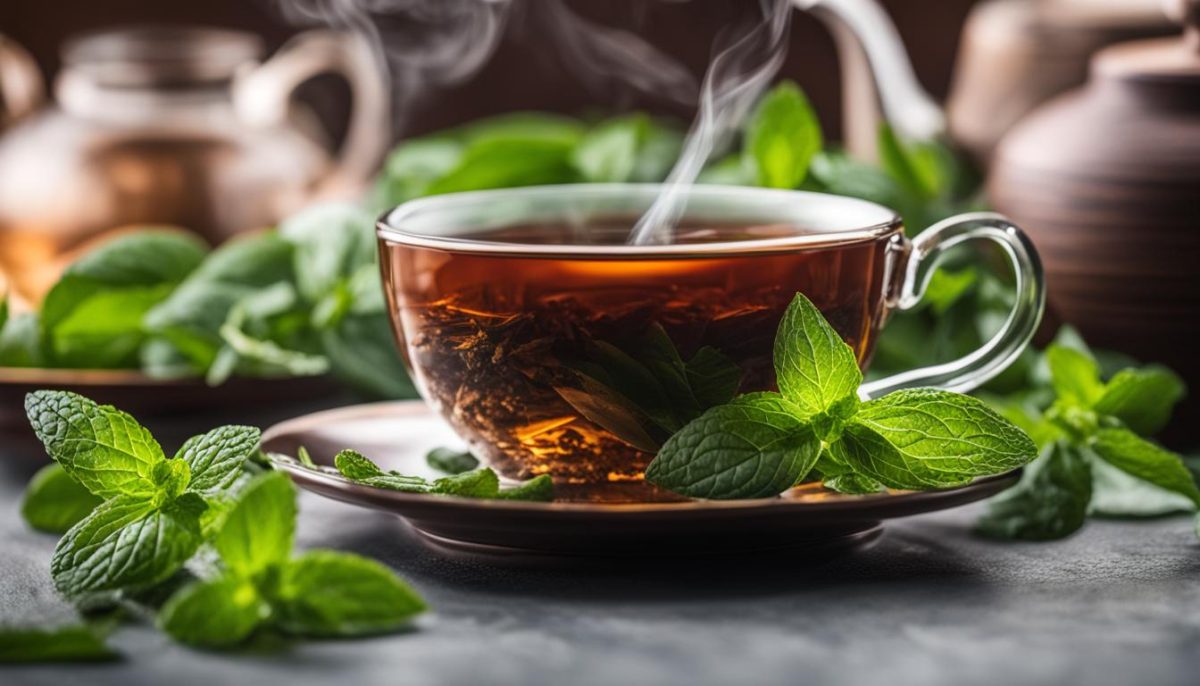
Hibiscus Tea for Blood Pressure and Cholesterol
Hibiscus tea is a delicious and tangy beverage that not only satisfies your taste buds but also offers potential health benefits. One of the key advantages of hibiscus tea is its ability to help manage blood pressure and cholesterol levels. Studies have shown that regularly consuming hibiscus tea can have a positive impact on individuals with stage one hypertension, when combined with lifestyle and dietary modifications.
In addition to its blood pressure-lowering effects, hibiscus tea also has the potential to reduce cholesterol levels. High cholesterol is a risk factor for cardiovascular disease, and by incorporating hibiscus tea into your diet, you may be able to support your heart health. The antioxidants present in hibiscus tea help to combat oxidative stress and inflammation, which are both associated with heart disease.
Furthermore, hibiscus tea has been found to have potential benefits for individuals with iron deficiency. Iron is an essential nutrient that plays a crucial role in the production of red blood cells and the delivery of oxygen throughout the body. Incorporating hibiscus tea into your diet may help improve iron absorption and reduce the risk of iron deficiency anemia.
The potential benefits of hibiscus tea include:
- Managing blood pressure
- Reducing cholesterol levels
- Supporting heart health
- Improving iron absorption
Hibiscus tea offers a refreshing and enjoyable way to support your health. By incorporating this tangy beverage into your routine, you can potentially manage blood pressure and cholesterol levels, promote heart health, and improve iron absorption. So why not indulge in a cup of hibiscus tea and reap the benefits it has to offer?
| Blood Pressure Management | Cholesterol Reduction | Heart Health Support | Iron Absorption Improvement | |
|---|---|---|---|---|
| Summary | Potentially helps manage blood pressure. | Potentially reduces cholesterol levels. | Potentially supports heart health. | Potentially improves iron absorption. |
Fennel Tea for Digestion and Menopause Symptoms
Fennel tea is a popular herbal infusion known for its digestive benefits and potential relief of menopause symptoms. This aromatic tea, made from the seeds of the fennel plant, has been used for centuries for its soothing properties and is a staple in many traditional medicine practices. Let’s explore how fennel tea can support digestion and provide relief during menopause.
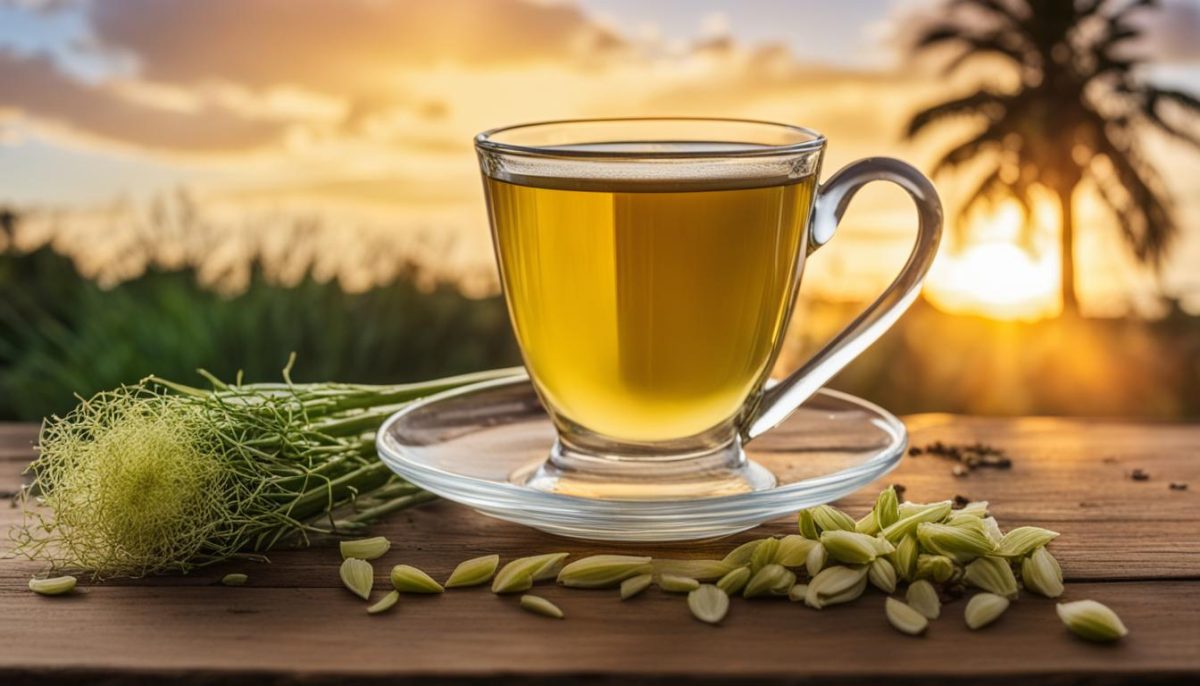
Digestive Benefits of Fennel Tea
Fennel tea has long been celebrated for its positive effects on digestion. It contains compounds that can help relax the muscles of the gastrointestinal tract, which may aid in relieving bloating, cramps, and gas. Additionally, fennel tea has been traditionally used to support bowel regularity and alleviate symptoms of indigestion.
The soothing properties of fennel tea can help ease discomfort and promote a healthy digestive system. It is often consumed after meals to aid in digestion and can be a gentle and natural alternative to over-the-counter digestive aids.
Relief of Menopause Symptoms
Menopause is a natural stage in a woman’s life that can come with various symptoms such as hot flashes, mood swings, and sleep disturbances. Fennel tea has been traditionally used to help alleviate some of these symptoms. It is believed to have estrogen-like effects, which can help regulate hormone levels and reduce the intensity of hot flashes and night sweats.
Additionally, fennel tea’s calming properties may help to ease mood swings and promote a sense of relaxation. It can be a comforting and natural option for women experiencing menopause-related symptoms.
| Benefits of Fennel Tea | Summary |
|---|---|
| Digestive support | Fennel tea can help relax the muscles of the gastrointestinal tract, aiding digestion and relieving symptoms of bloating and indigestion. |
| Regulates bowel movements | Fennel tea has been traditionally used to support bowel regularity and promote a healthy digestive system. |
| Alleviates menopause symptoms | Fennel tea’s estrogen-like effects may help regulate hormone levels and reduce the intensity of hot flashes and night sweats during menopause. It may also promote relaxation and ease mood swings. |
In conclusion, fennel tea offers digestive support and may provide relief for menopause symptoms. With its soothing properties and potential benefits, it can be a valuable addition to your daily routine. Whether you’re looking to support your digestive health or seek natural remedies for menopause, fennel tea is worth considering.
Cooking with Tea
Tea is not only a delightful beverage to enjoy on its own, but it can also be a versatile ingredient in cooking, adding unique flavors and potential health benefits to your dishes. Incorporating tea into your culinary creations allows you to explore a whole new world of flavors and experiment with different combinations. Here, we will explore the benefits of using tea in cooking and some creative ways to incorporate it into your recipes.
Enhancing Flavors
Tea can add depth and complexity to both savory and sweet dishes. The natural flavors and aromas found in various types of tea can elevate your cooking to new heights. For example, a black tea-infused glaze can add a rich and smoky flavor to grilled meats, while a green tea-infused dessert can bring a refreshing and subtly bitter note to your sweet treats.
Health Benefits
Aside from the flavor profile, using tea in cooking can also provide health benefits. Many teas contain antioxidants and other bioactive compounds that can promote overall wellness. For instance, green tea is known for its antioxidant properties, which can help reduce inflammation and protect against chronic diseases. By incorporating green tea into your recipes, you can boost the nutritional value of your meals while adding a unique twist.
Creative Uses
There are endless possibilities when it comes to cooking with tea. You can use tea as a marinade for meats, fish, or tofu to infuse them with delicate flavors. Tea can also be infused into oils, broths, or sauces to provide a subtle yet distinct taste. Additionally, you can use brewed tea as a base for soups, stews, or grains like quinoa, adding complexity and uniqueness to your dishes.
Experimenting with tea in your cooking can open up a world of culinary possibilities. Whether you’re a seasoned chef or a home cook, adding tea to your recipes can bring a new level of creativity and flavor. So, next time you’re in the kitchen, don’t forget to harness the power of tea and let your culinary imagination flourish.
Green Tea for Cognitive Function and Anti-Aging
Green tea is a popular beverage that offers numerous health benefits, particularly when it comes to cognitive function and anti-aging effects. Studies have shown that green tea can enhance cognitive performance, specifically in the areas of attention, memory, and information processing. The antioxidants present in green tea, such as catechins and polyphenols, play a crucial role in protecting brain cells from damage and reducing the risk of age-related cognitive decline.
Furthermore, green tea’s antioxidant properties contribute to its anti-aging effects. The polyphenols in green tea help combat the harmful effects of free radicals and oxidative stress, which are major contributors to aging and various age-related diseases. By reducing oxidative damage, green tea may help slow down the aging process and promote overall longevity.
It’s important to note that while green tea offers potential cognitive and anti-aging benefits, it should be consumed as part of a balanced diet and healthy lifestyle. Drinking green tea alone may not be a magical solution, but rather a complementary measure to support brain health and delay the aging process.
Green Tea Benefits for Cognitive Function:
- Enhances attention, memory, and information processing
- Protects brain cells from damage
- Reduces the risk of age-related cognitive decline
Green Tea Benefits for Anti-Aging:
- Combats the harmful effects of free radicals and oxidative stress
- Reduces oxidative damage
- Promotes overall longevity
| Green Tea | Cognitive Function | Anti-Aging Effects |
|---|---|---|
| Enhances attention, memory, and information processing | Combats the harmful effects of free radicals and oxidative stress | Protects brain cells from damage |
| Reduces the risk of age-related cognitive decline | Reduces oxidative damage | Promotes overall longevity |
In summary, incorporating green tea into your daily routine can have positive effects on cognitive function and provide anti-aging benefits. Its antioxidant properties help protect brain cells and reduce the risk of cognitive decline. Additionally, green tea’s ability to combat oxidative stress contributes to its anti-aging effects. So, why not enjoy a cup of green tea and take advantage of its potential health benefits?
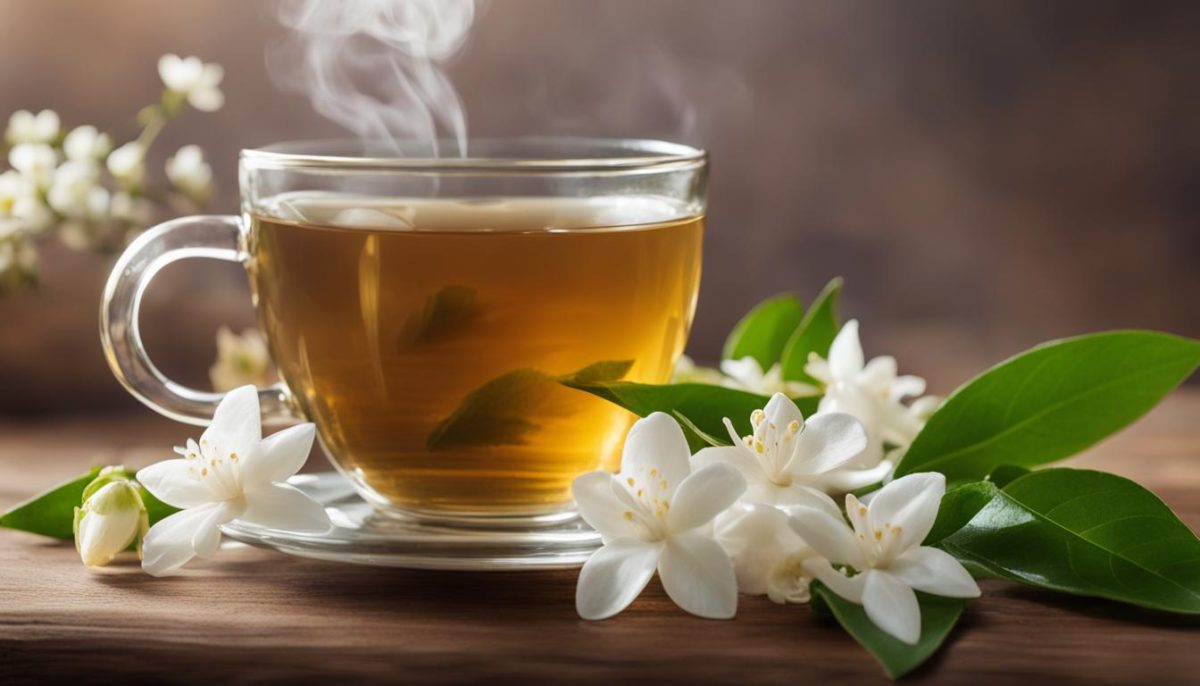
Jasmine tea combines the benefits of green tea with the calming and soothing effects of jasmine flowers. The delicate aroma and floral taste make it a popular choice for relaxation and stress reduction.
Drinking jasmine tea has been associated with improved physical well-being and mental relaxation. The scent of jasmine itself has been known to have a positive impact on mood and can help reduce anxiety and stress levels.
Enjoy a cup of jasmine tea after a long day to unwind and promote a sense of tranquility. The combination of green tea’s antioxidant properties and jasmine’s therapeutic effects make it an ideal choice for those seeking a calming and soothing beverage.
Benefits of Jasmine Tea:
- Calming and soothing effects
- Reduced anxiety and stress
- Promotes relaxation
- Improved mood
- Antioxidant properties
“The experience of sipping a cup of jasmine tea can transport you to a state of calm and serenity, allowing you to let go of the stresses of the day.”
Table: Comparison of Different Teas and Their Effects
| Tea | Health Benefits |
|---|---|
| Chamomile Tea | Improved sleep, immune health, anti-inflammatory and anti-anxiety properties |
| Ginger Tea | Nausea relief, improved digestion, potential anticancer and blood sugar control properties |
| Peppermint Tea | Relief for digestive issues, relaxation of intestinal tract, alleviation of bloating and irritable bowel syndrome symptoms |
| Hibiscus Tea | Blood pressure and cholesterol management, iron deficiency prevention, potential obesity protection |
| Jasmine Tea | Calming and soothing effects, stress reduction |
| Rooibos Tea | Liver health support, blood pressure regulation, antioxidant properties |
| Lemon Verbena Tea | Mood regulation, antioxidant boost, heart health improvement |
Rooibos Tea for Liver Health and Blood Pressure
Rooibos tea, also known as red bush tea, is a herbal infusion that offers several potential health benefits. It is caffeine-free and rich in antioxidants, making it a popular choice for those looking to support their liver health and manage blood pressure.
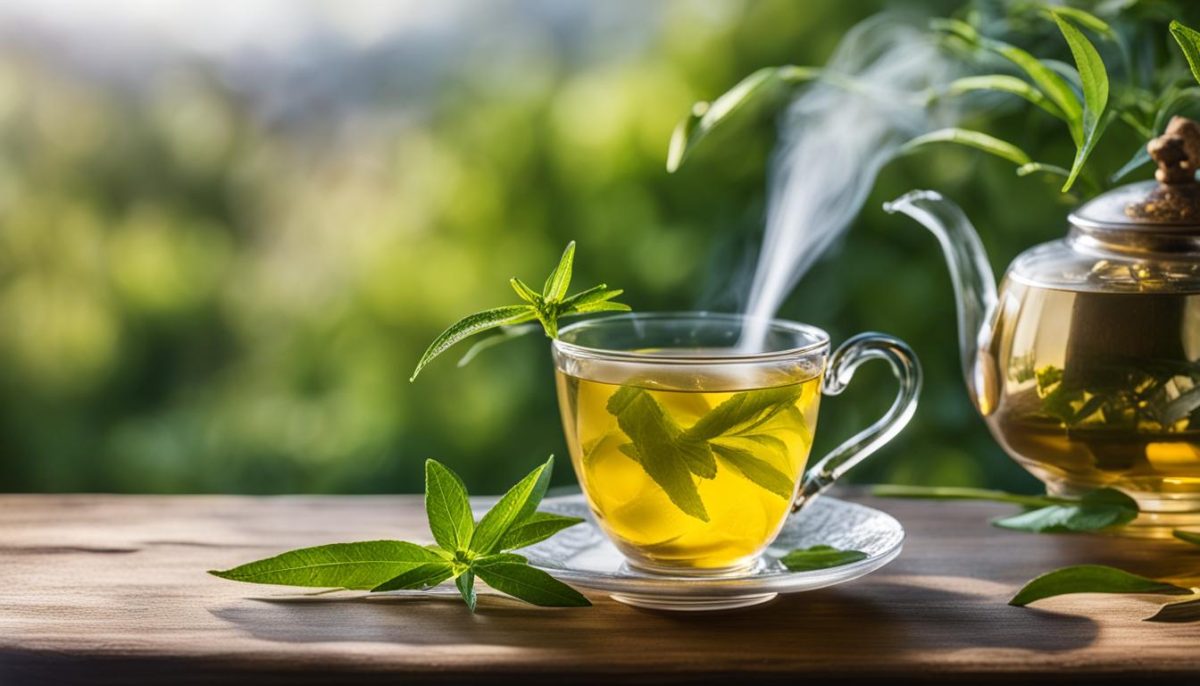
The Benefits of Lemon Verbena Tea at a Glance:
- Promotes mood regulation and reduces symptoms of depression and anxiety
- Provides an antioxidant boost to protect against cellular damage
- Offers a refreshing and uplifting citrus flavor
- Can be enjoyed at any time of the day for a soothing experience
Enjoying the Health Benefits of Tea in Various Forms
Tea is a versatile beverage that can be enjoyed in various forms, allowing you to savor its health benefits in different ways. Whether you prefer a comforting cup of hot tea, a refreshing glass of iced tea, or incorporating tea into your favorite recipes, there are numerous ways to enjoy the goodness of this ancient elixir.
To elevate your tea-drinking experience, consider exploring different types of tea. From black tea to green tea, oolong to herbal infusions, each variety offers unique flavors and potential health benefits. Experiment with different tea blends and find the ones that suit your taste preferences and wellness goals.
One delightful way to incorporate tea into your culinary adventures is by using it in cooking and marinades. The natural flavors and medicinal properties of tea can add depth and complexity to your dishes. Consider using leftover tea to infuse grains like quinoa or rice, adding a subtle yet distinct taste. Tea can also be used as a flavorful marinade for chicken, fish, or meat, infusing them with delicate notes and potential health benefits.
When it comes to enjoying tea in different forms, let your creativity guide you. Explore tea-infused desserts and baked goods, such as matcha-flavored cakes or earl grey-infused cookies. You can even experiment with tea-based cocktails and mocktails, combining your favorite teas with complementary flavors for a refreshing beverage.
Table: Tea Types and Their Versatile Uses in Cooking and Marinades
| Tea Type | Taste Profile | Potential Uses |
|---|---|---|
| Black Tea | Robust, malty, and full-bodied | Infusing into chocolate desserts, braising meats, marinating tofu or tempeh |
| Green Tea | Grassy, fresh, and slightly vegetal | Adding to smoothies, incorporating into salad dressings, poaching fish or shrimp |
| Oolong Tea | Floral, fruity, and complex | Pairing with seafood dishes, incorporating into stir-fries, infusing into creams or custards |
| Herbal Infusions | Varies based on ingredients | Adding flavor to baked goods, infusing into syrups or sauces, blending into refreshing mocktails |
By embracing the versatility of tea, you can not only enjoy its health benefits but also elevate your culinary creations. Whether you’re a tea enthusiast or a curious beginner, there are endless ways to savor the magic of tea in different forms. So, let your imagination run wild and discover the delightful world of tea in cooking, baking, and mixology.
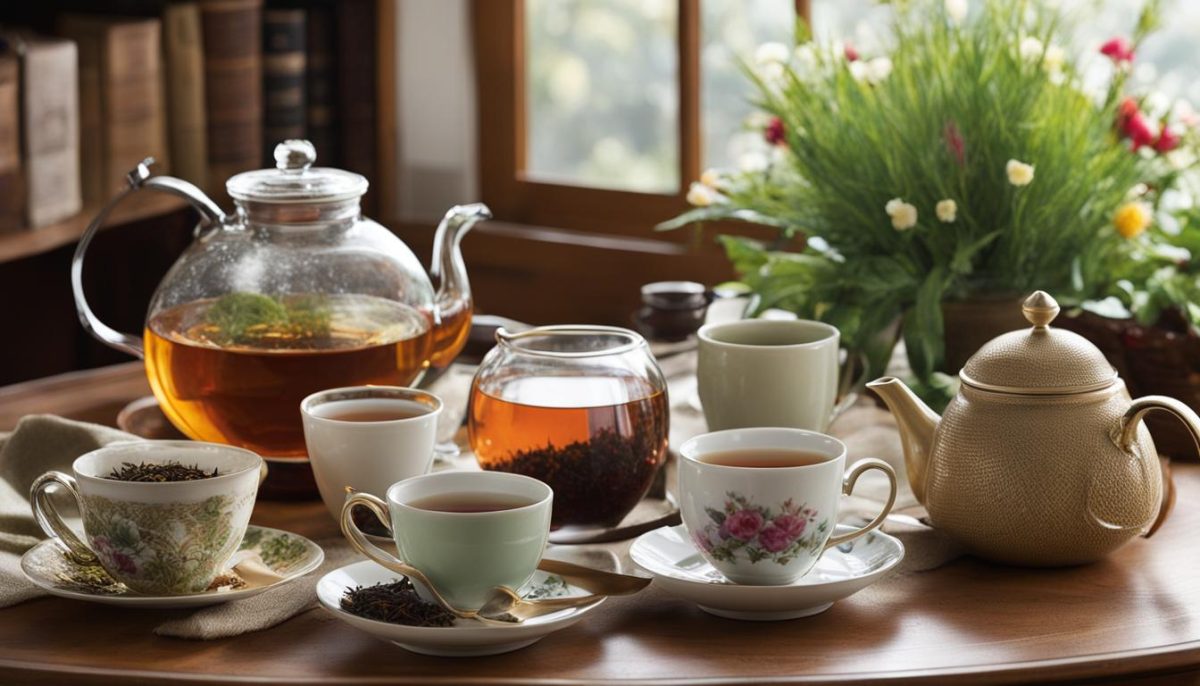
Conclusion
In conclusion, tea offers a multitude of health benefits that can support our overall well-being. From promoting sleep and digestion to reducing inflammation and regulating blood pressure, the different types of tea each have their unique advantages.
Chamomile tea is known for its calming effects, aiding in sleep and supporting immune health. Ginger tea helps alleviate nausea, aids digestion, and offers potential anticancer and blood sugar control benefits. Peppermint tea promotes healthy digestion, relieves bloating, and may help with irritable bowel syndrome. Hibiscus tea can assist in managing blood pressure, cholesterol levels, and iron deficiency. Fennel tea supports digestion and may ease menopause symptoms.
When it comes to cognitive function and anti-aging, green tea has been linked to better memory and potential protection against Alzheimer’s disease. Jasmine tea combines the benefits of green tea with the calming effects of jasmine flowers, contributing to improved physical well-being and stress reduction. Rooibos tea protects the liver, helps lower blood pressure, and provides a calming effect without caffeine. Lemon verbena tea regulates mood, boosts antioxidants, improves heart health, and reduces symptoms of depression and anxiety.
Incorporating tea into our daily routine can be done in various forms, whether enjoyed as a hot cup, iced tea, or used in cooking and marinades. The health benefits of tea are vast and can be enjoyed by all, making it a valuable addition to our lives.
FAQ
What are the health benefits of tea?
Tea offers a wide range of health benefits, including promoting sleep and digestion, reducing inflammation, regulating blood pressure, and providing antioxidant protection.
What types of tea are known for their health benefits?
Chamomile tea, ginger tea, peppermint tea, hibiscus tea, green tea, jasmine tea, rooibos tea, fennel tea, and lemon verbena tea are all popular for their unique health benefits.
What are the medicinal properties of chamomile tea?
Chamomile tea is known for its calming effects, aiding in sleep and supporting immune health. It also has potential anti-inflammatory, antioxidant, anticancer, and blood-pressure-lowering properties.
How does ginger tea benefit digestion?
Ginger tea can alleviate nausea and aid digestion. It is also a safe and effective treatment for nausea and vomiting during pregnancy and chemotherapy. Ginger’s compounds, gingerols, may also protect against diseases like diabetes and cancer.
How does peppermint tea promote digestive health?
Peppermint tea contains menthol, which helps relax the intestinal tract and alleviate bloating. It can also relax gastrointestinal tissues and has been used as a treatment for irritable bowel syndrome.
What are the health benefits of hibiscus tea?
Hibiscus tea may help manage blood pressure and cholesterol levels. It has been found effective for stage one hypertension and may reduce blood pressure, cholesterol, blood sugar, body fat, and iron deficiency.
What are the benefits of fennel tea?
Fennel tea supports digestion and helps with bowel regularity. It is widely used for treating digestive issues and may also offer relief for menopause symptoms in postmenopausal women.
How can tea be used in cooking?
Tea can be used in cooking to enhance flavors and reap its health benefits. Leftover tea can be used to cook grains like quinoa, brown rice, or couscous. It can also be used as a marinade for chicken, fish, or meat.
What are the cognitive-enhancing effects of green tea?
Green tea has been linked to better working memory and may reduce the risk of Alzheimer’s disease. Its polyphenols act as antioxidants, protecting against cellular damage and potentially offering anti-aging effects.
What are the calming effects of jasmine tea?
Jasmine tea combines the benefits of green tea with the calming and soothing effects of jasmine flowers. It has been associated with improved physical well-being and stress reduction.
How does rooibos tea benefit liver health and blood pressure?
Rooibos tea is rich in antioxidants and has been shown to protect the liver from oxidative stress. It may also help lower blood pressure and relax tense muscles. It contains no caffeine, making it a suitable choice for a calming drink.
What are the anti-inflammatory and antitumoral effects of hibiscus tea?
Hibiscus tea, particularly its calyces and leaves, contains antioxidants that can protect against cellular damage and fight certain types of cancer cells. It has also been linked to decreased oxidative stress and anti-inflammatory properties.
How does lemon verbena tea regulate mood and boost antioxidants?
Lemon verbena tea has a subtle citrus aroma and can help regulate mood and relax nerves. It increases antioxidant levels, improves heart health, and reduces symptoms of depression and anxiety.
In what ways can tea be enjoyed?
Tea can be enjoyed in various forms, including traditional steeping, iced tea, and using it in cooking and marinades. There are many ways to incorporate tea into your daily routine and experience its health benefits.


